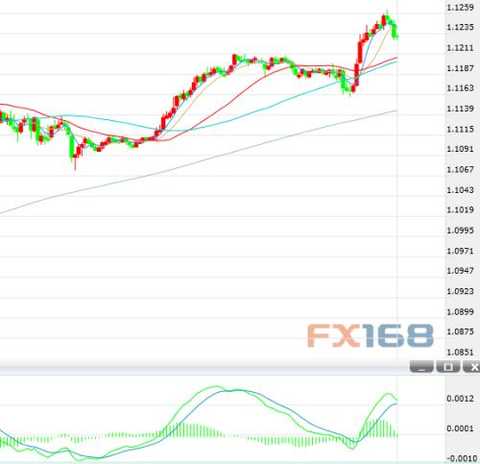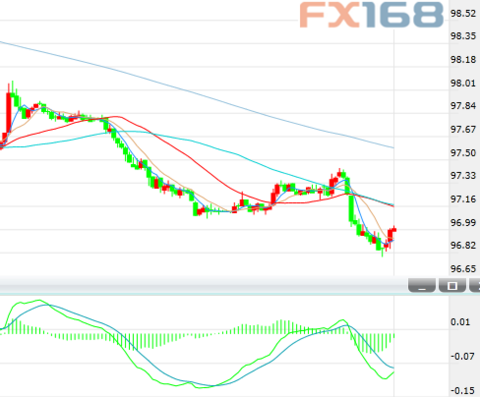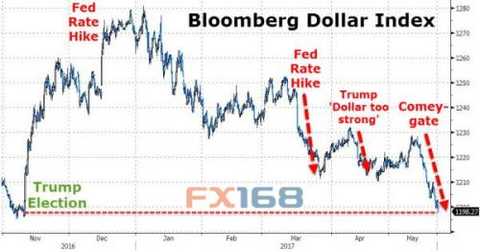On Monday (May 22), German Chancellor Angela Merkel bluntly stated that “the euro is too weak†is the chief culprit of Germany’s high trade deficit. This statement boosted the euro/dollar to a six-month high and rose above the 1.12 mark. The recent economic situation in the Eurozone has improved expectations of a reduction in moderate comments by the European Central Bank at its next meeting of the Management Committee. In addition, the technical level of the euro / dollar has also risen through multiple key trend lines, the euro is expected to rise further. The improvement of European fundamentals is in stark contrast to the political turmoil in the United States and the weak economic data. The US dollar index continued to fall under the suspicion of internal and external troubles, and the long-term loss of the city fell below the 97 mark.
During the day, the euro/dollar climbed sharply, reaching a new high of 1.1263 at a six-and-a-half-month high, and a high of 1.13 on November 9. Earlier, German Chancellor Angela Merkel said before the G7 Leaders Summit that the euro "too weak" is the reason for the huge German trade deficit.

(Euro/US Dollar 30 Minute Chart, Source: FX168 Financial Network
Merkel told a student at a secondary school in Berlin that Germany’s huge export earnings were driven by the euro’s exchange rate and oil prices, and the government could not influence it.
Germany has repeatedly refutes the accusation that the United States has its trade surplus, saying that no one can blame Berlin for the competitiveness of its products.
But these comments sparked market speculation that Washington may put more pressure on the issue at a later meeting this week, and German officials may further urge the European Central Bank to strengthen its position on raising interest rates this year.
Merkel said: "The euro is too weak and is affected by the policies of the European Central Bank. In view of this, German products are relatively cheap."
This is Germany's latest "accusation" against the European Central Bank, after the Bank of Germany Governor Schaeuble has accused the ECB's policy is too loose.
This remark helped the euro to rebound by about 0.5% from around 1.1160.
“It does have an impact on the euro, but we need to remember what she said is obvious,†said Manuel Oliveri, strategist at Credit Agricole.
“The ECB’s monetary policy stance is aimed at the entire Eurozone, so there is no doubt that Germany is in a better position than other Eurozone countries. From this point of view, her comments should not bring the euro. Continuous impact."
The recent economic situation in the Eurozone has improved expectations of a reduction in moderate comments by the European Central Bank at its next meeting of the Management Committee.
In the past two weeks, the euro/dollar has risen by about 3.2%, and has soared 6% since April 10.
The minutes of the European Central Bank’s April meeting released last week showed that the central bank will reassess the economy in June, which means that the next resolution may reveal key factors affecting the euro. According to a Reuters survey, 31 of the 43 analysts surveyed believe that the central bank will imply a gradual withdrawal from QE by September of this year.
After the net position in the previous week turned to a net long position, the current net long position in the euro is further refreshing to a three-year high. According to data released by the US Commodity Futures Trading Commission (CFTC) last Friday (May 19), the euro's net long position in the most recent week rose to a three-year high. As of the week of May 16, the euro's net long position was 37,604, the highest level since March 2014.
Scotiabank said that short-covering is still the main driver of the recent changes in the euro's position. Since mid-April, the shorts have almost cut the overall short position by about half.
From a technical perspective, some analysts pointed out that as the euro/dollar rose above the multiple key trend lines below the 1.10 mark. The current upside of the EUR/USD has been completely opened, and the market outlook does not rule out the possibility of further testing the 2016 full year high of around 1.16.
In contrast, the technical shape of the US dollar index has deteriorated significantly. The previous fall of the rising channel and the dead end of the moving average indicate that the medium and long-term uptrend may have ended.
Earlier in the European session, the dollar recovered from a basket of currencies during the worst week of the year. As the euro soared, the US dollar index fell sharply, falling below the 97 mark, and the lowest fell to 96.79, the lowest level since November 9 last year.

US index 30 minutes chart, source: FX168 financial network)
As the US dollar index fell on the 8th in the past 9 days, the period fell 2.4%, the dollar has erased all the gains since the election fell to the lowest level since November 6, 2016.

(Source: ZeroohedGE, FX168 Financial Network)
Pablo Piovano, an analyst at FXStreet, a well-known financial website, pointed out that today the US dollar index fell below the 97 mark and retreated all the gains since November 9 last year, which was closely watched by the market. German Chancellor Angela Merkel said today that the euro is "too weak". This remark stimulated the entry of the dollar seller and the dollar was under selling pressure. According to the CFTC report last Friday, the speculative net long position has been reduced. At the lowest level in early 2016, the dollar remained under pressure. The minutes of the Fed meeting will be released in the morning of Thursday, Beijing time. The FOMC votes, Kashkali, Huck and Brainard, who will deliver a speech today and tomorrow, are expected to continue to comment on the US dollar.
The reason why the dollar will continue to fall further lies in the US President Trump administration. Despite the cooling of the political crisis, investors are still assessing the impact of the US political turmoil.
The dollar has fallen into plunging since President Trump dismissed the FBI FB I. Market bets that Trump may have difficulty completing its term of office, which may be impeached and step down.
Trump’s visit to the Middle East seems to have temporarily cooled the political storm in Washington. Some people worry that this storm will not affect Trump’s presidency, but it may also affect his tax reform and fiscal stimulus.
To make matters worse, this political turmoil happened to happen when the US economic data was weak, which caused the market to lower the Fed’s further interest rate hike expectations this year, which made the relative attractiveness of the dollar weaker.
US St. Louis Fed President Brad said on Friday that the economy has recently shown signs of weakness, and the Fed’s expected rate hike plan may be too fast for the economy.
Some Fed policymakers will speak this week, and the Fed will announce the minutes of the May meeting on Wednesday. When the Fed met in May, there was no political turmoil in the United States.
According to CME Group's FedWatch, futures traders believe that the probability of a rate hike by the Fed in June is about three-quarters, but that the probability of two or more rate hikes in 2017 is only 40%.
“We still expect to raise interest rates in June, but given the political situation, the impact of interest rate hikes on the foreign exchange market may be limited,†said Harumi Taguchi, principal analyst at IHS Markit.
“At the same time, Europe is becoming a bright spot in the global economy,†she said.
"The dollar will definitely hope to see more grace and hear less noise this week," ING strategist said in a report.
"But weigh the speculative speculation, the geopolitical risks, the limited increase in the budget, and the minutes of the Fed meeting. It is difficult to see that the dollar is not continuing to be on the defensive, but trying to recover some of the recent declines."
However, Adam Cole, currency strategist at RBCCA pital Markets, said, "We still tend to think that the dollar is more."
"The cooling of the interest rate hike is a bit counter-attack, but the situation is quite calm this morning, and the next few days this week."
In addition, the improved economic outlook in Europe also encourages investors to buy the euro, which further suppresses the dollar.
AyaKO Sera, senior market analyst at Sumitomo Mitsui Trusts, said, "The theme of the market is that the US dollar is weak due to the US political situation and the recent strong euro."
French bank Societe Generale 601166, BUY (Societe Generale) said the dollar fell below the index began in 2014 (98.50 / 98.85) and the upward trend line since December last year downtrend line.
The bank pointed out that under this circumstance, the US dollar index may expand the decline, and the next level concerns the vicinity of 96.45 at the bottom of the daily chart channel. It is also the 61.8% retracement of the downtrend since May 2016, which constitutes an important support.
Single Covered Yarn,Single Covered Spandex Socks,Spandex Covered Yarn,Spandex Air Covered Yarn
Shaoxing Shiffon Textile Co., Ltd , http://www.shiffontex.com